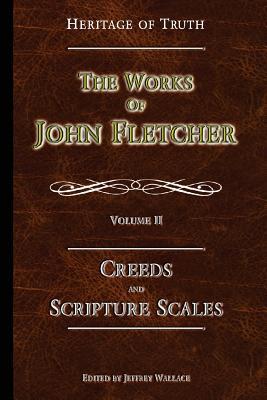- Bible
- Read the Bible
- Bible Versions
- Verse of the Day
- Reading Plans
- Verses by Topic
- Books of the Bible
- Bible Images
- Study
- Commentaries
- Concordances
- Dictionaries
- Encyclopedias
- Sermons
- Bible Atlas & Maps
- BP Wiki
- Devotionals
- Today's Devotionals
- Light of the World
- All Devotionals
- Inspirational Quotes
- More
- Picture Quotes
- Videos
- Inspirational
- Bible Study
- What The Bible Says
- Bible Q&As
- Daily Bread
- Bible by Genre
- Bible Stories
- Random Bible Verse
- Community
- Store
Creeds and Scripture Scales: The Works of John Fletcher
by John Fletcher
In this second volume of John Fletcher's Works, he continues his assault on the perversions of Calvinism and its insubstantial misrepresentation of those they label Arminians and Pelagians. An examination of established creeds, both false and genuine, becomes necessary in any serious debate of the issue and his exhibition and comparison of Scripture with Scripture set forth in parallel scales, brings truth to the forefront when the false way of Reformed Theology would just as well keep it obscured. Fletcher's genius is embedded in his genial comportment with the principles and precepts of the Scriptures. With such a grasp on Biblical injunctions of inward piety and superficies coupled with the necessity of proper hermeneutic, Fletcher belies the tendency of Calvinism's undermining of spiritual nutrition inherent in the Word of God. Never has there been a time of greater need for dogmatic insistence on the veracious handling of the Scriptures than now. With men waxing worse and worse, deceiving and being deceived, the importance of clinging to proper doctrine is essential. Hence, Apprehending Truth Publishers presents for your consideration, The Works of John Fletcher, Volume 2: Creeds and Scripture Scales.
BUY NOW
Paperback, 456 pages
Published June 11th 2013 by Apprehending Truth Publishers
© 2025 Bibleportal.com All rights reserved.

Born in Switzerland on September 12, 1729, John William Fletcher was educated at Nyon. As a young man he intended to enter the army. A series of circumstances foiled his plans. In visiting England in 1752, he fell under the influence of Methodism and determined immediately to become a pastor. Five years later he was ordained. After assisting John Wesley and preaching to French-speaking Swiss expatriates, he threw himself into assisting the vicar of Madeley.
Madeley was a hard town. Fletcher literally chased down sinners to share the gospel with them. No matter what the excuse they gave for not attending church, he tried to rob them of it, even walking through the streets ringing a bell loudly at five in the morning to deny them the pretense that they could not waken themselves on Sunday morning. He was a warm supporter of Sunday schools and set up one himself at Madeley.
No weather could keep him indoors. Wherever and whenever he was needed, there he was found. To help the poor he gave himself so greatly that his health broke, a condition aggravated by his constant exposure to the elements.
John Fletcher was strong in his insistence on regeneration. Only with a new birth, a new creation, did one belong to Christ. This is a constant theme of his sermons and writings. In a sketch telling of his conversion, he says he was a religious enthusiast at 18 but did not apprehend Christ from his heart. A nightmare in which he found himself rejected with the damned woke him to a real need for Christ. He saw that all the good works he'd done had been from pride or from fear of Hell, not for love of God. Nonetheless he felt that the fear he went through was an essential part of becoming a Christian.
In 1776 he had scripted a tract decrying the American Revolution. A copy was forwarded to the king of England. The latter wanted to repay him with any ecclesiastical "plum" Fletcher cared to name. Graciously he turned down his monarch, adding, "I want only more grace."
He wrote prolifically. And although born and reared in Switzerland, John Fletcher adopted the English language so thoroughly that he left fine works in it. He is considered one of the great early Methodist theologians.
John Wesley was dismayed to learn of Fletcher's death. The heartbroken 82-year old agreed to conduct the funeral. The text for Wesley's address leapt off the page at him: "Mark the perfect man, and behold the upright." (Psalm 37:37)
... Show more